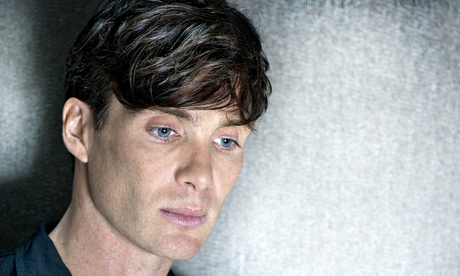
For someone who famously hypnotised Christopher Nolan with his performance, and his penetrating eyes, in not one but two Batman movies, Cillian Murphy seems keen to pass as anonymously as possible in interviews: a dad of two young sons, with his partner of almost 20 years (visual artist Yvonne McGuinness), he lives in the unglitzy London borough of Kilburn and says his only vices are “Tabasco on everything” and Dragons’ Den. “I can watch Dragons’ Den for hours,” he says. “Why are they in that warehouse? Why is the music so ominous? Why are they sitting there with piles of cash like mini-dictators. Such terrible people, all of them. It’s riveting.”
You’d never guess that as a teenager this slight, unassuming man was the frontman in a Frank Zappa-inspired band with a five-album deal. The roles that he’s played since he dropped out of his law degree to become an actor have also hardly been quiet supporting turns. Danny Boyle, who gave Murphy his big break as the lead in 2002’s 28 Days Later and then put him in his sci-fi epic Sunshine, says the actor is still underrated. Ken Loach, who directed Murphy in Palme d’Or-winning The Wind That Shakes the Barley, described his instinct as “dead right” and “quite rare”.
Murphy is about to return to the screen as Tommy Shelby, the Somme-scarred leader of the Peaky Blinders, a gang who roamed Birmingham in the early 1900s, slashing their victims with razor blades sewn into flat caps. The show was supposed to be a one-off: a moody period piece with a steampunk fetish, doing its best to look less Hovis ad, more HBO. In this second series Tom Hardy joins the cast but Murphy is still the main weapon.
“I’m really a wimp,” he says, dressed in the uniform of the off-duty actor: T-shirt, leather jacket, dark jeans. “It’s nice to play a guy who’s tough. I’d only played two villains and they were more psychological.” (The Scarecrow in The Dark Knight Rises and Rachel McAdams’s stalker in Red Eye.) “Tommy Shelby,” says Murphy, “is properly tough.”
Nolan, who also cast Murphy in Inception, said he tried to pack in as many close-ups of Murphy’s blue eyes as possible. Oh, those eyes – huge, blue marbles that seem to work almost as a separate entity to their owner: there are tumblrs solely devoted to Murphy’s career-defining peepers.
And yet Murphy, the son of two teachers from the west of Ireland, finds himself in an apparently rare category for an actor with his talent and looks: celebrated without being a celebrity, in-demand with no reputation for being demanding.
“It’s the easiest thing in the world to do!” he says. “Don’t go to openings, don’t go to those parties. It’s avoidable.” Although he thinks the pressures are more “upsetting and aggressive” for women, he believes “there are still lots of people at a high level” who manage to stay grounded. “I wish it was easier for me, but it’s excruciating. Who likes talking about themselves?”
Actors! I say. He cringes. Murphy’s first (and last) TV interview took place just three years ago, on the Late Show in Ireland. “Logically, the less people know about you, the more convincing you are playing someone else. It’s glaringly obvious to me. I get the bus, I get the tube, I go to the shop and get the milk and do normal things. I would hate it if that became impossible. As an actor, you’re supposed to be playing real people so it seems essential to live like a normal person.”
If his refusal to play the celebrity game has harmed his status in Hollywood, he seems wholly unbothered. He has managed to hop, credibly, between blockbusters and budget films, TV and theatre – and is presently getting rave reviews in Ballyturk at the National Theatre, a play written and directed by his long-time friend and collaborator Enda Walsh. Still, his agents must get furious when he refuses to cash in on the “heat” generated by some of his movies.
“The thing people fail to realise is that the agents work for us. The agents don’t tell us what to do. Or they don’t tell me what to do. I tell them what I’m doing.” He smiles. “The only thing I’ve tried to stick to, and I’ve repeated it ad nauseum, is to follow the good writing. I don’t want to go to America and up sticks to wherever a shoot may be for 12 months. I’ve got young kids, you don’t really want to uproot the family for a year.” Peaky Blinders, he says, “doesn’t preclude me from doing other work I want to do”.
Ballyturk is a case in point. Deliberately contrived to go over your head but burrow under your skin, the play revels in having no plot and little logic, just plenty of manic, funny clowning instead. It’s probably the most demanding physical performance London’s National Theatre will stage all year: Murphy, appearing alongside Mikel Murfi and Stephen Rea, ends the show drenched in sweat, sometimes “needing to drink four pints really quickly”, and sometimes going straight home to bed.
Murphy is so adept at giving so little away that you begin to understand why he clicks so well with Walsh and his work. “Art shouldn’t be prescriptive,” he says. “It should be what you want, it should be interpretive. Enda doesn’t ask any questions – or answer them. And I love that.”
• Peaky Blinders returns to BBC2 on 2 October and BBC First in Australia on 16 October

